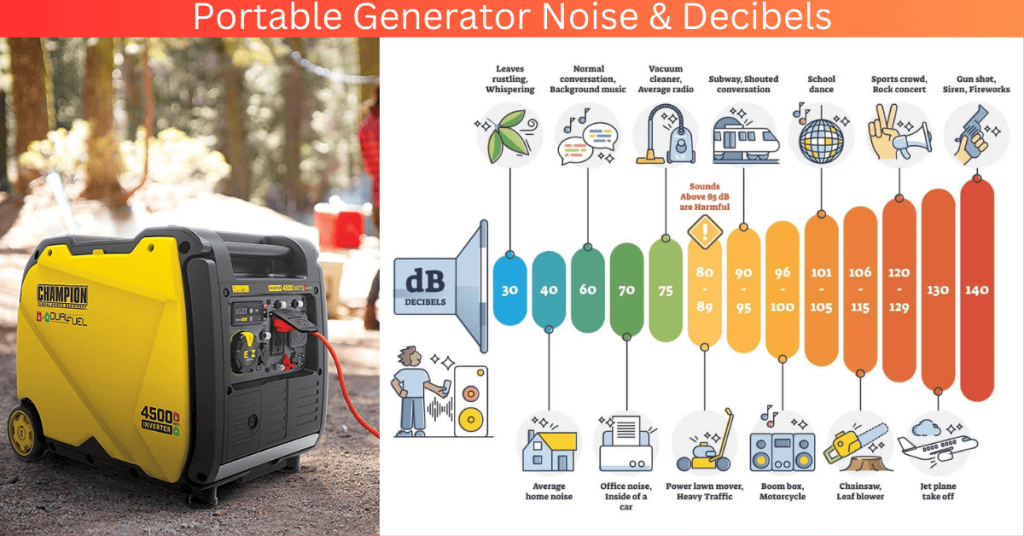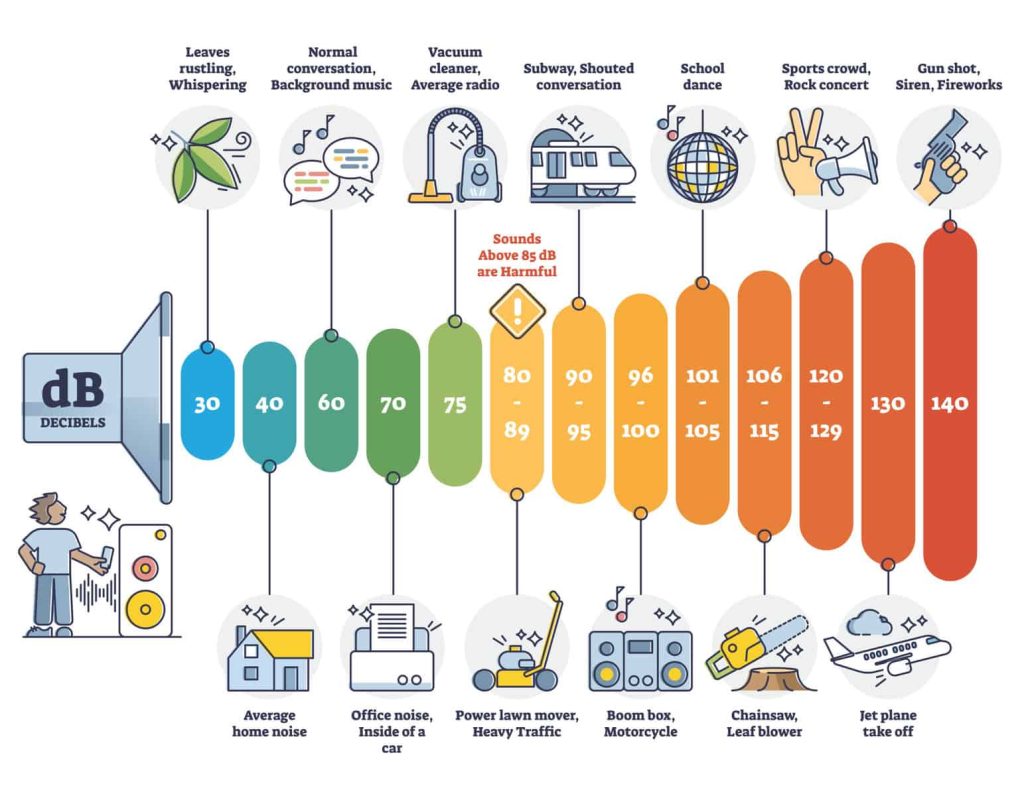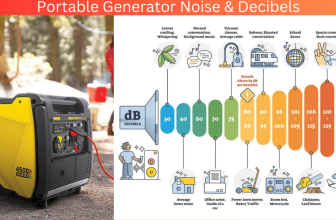Portable generators offer a convenient source of backup power for various applications, but they often come with an unwelcome side effect: noise.
Managing the sound output is crucial to ensure the surrounding environment’s comfort and safety. In this blog post, we’ll discuss how to properly evaluate noise output in portable generators, compare popular models’ noise levels, and share some best practices for reducing that noise.
Key Takeaways
- Portable generators can emit noise levels ranging from 50 decibels to over 100 decibels, making it crucial to evaluate noise output before purchasing one.
- Quieter portable generator options are available in the market, such as modern standby and battery – powered generators, or soundproofing materials like enclosures or barriers can be used to reduce noise pollution.
- Proper placement of the generator is key to reducing noise levels, including placing it at least 20 feet away from homes and neighbors, on level surfaces and in sheltered areas. Regular maintenance also ensures that the generator functions optimally with reduced noise output.
- Noise reduction is important for personal comfort and convenience as well as health reasons since excessive exposure to high decibel levels can cause hearing loss and other detrimental effects on our neuro-endocrine system. It’s vital to comply with local ordinances regarding acceptable sound outputs of outdoor power equipment for harmonious relationships within a community.

Understanding Portable Generator Noise Output
Portable generators can emit noise levels ranging from 50 decibels to over 100 decibels, which is equivalent to the sound of a normal conversation and a chainsaw, respectively.
Types Of Portable Generators
There are several types of portable generators available in the market, each designed to cater to specific needs and preferences.
Conventional gas-powered portable generators are the most common type; they run on gasoline and offer a simple yet reliable source for power during emergencies or outdoor events.
Propane or dual-fuel models provide flexibility as they can be fueled by both propane and gasoline, making them a convenient choice for those seeking multiple fuel options.
Inverter generators are known for their quiet performance and clean energy output suitable for sensitive electronic devices; these use advanced technology to ensure efficient power generation while minimizing noise levels.
As a potential customer shopping around for a portable generator that meets your requirements, it’s essential to consider factors such as portability, power output capacity (measured in watts), run time duration (based on the fuel tank size), ease of operation and maintenance – but most importantly: noise level outputs!
Importance Of Noise Reduction
Noise reduction in portable generators is essential for various reasons, making it a critical factor to consider when purchasing one. Firstly, excessive noise from generators can be highly disruptive and annoying, especially if you’re using a generator for camping or RV trips.
Aside from personal comfort and convenience, reducing power generator noise is also crucial for health reasons. Prolonged exposure to high decibel levels can cause detrimental effects on our neuro-endocrine system and even lead to potential hearing loss.
Moreover, your neighborhood-friendly reputation could suffer if your residential generator constantly disturbs the peace in your community. In fact, several laws and regulations surrounding allowable sound output of outdoor power equipment have been established to address this issue.
Noise Level Certification Standards
As a possible customer, it’s essential for you to be aware of noise level certification standards when selecting portable generators. These certifications help ensure that generator manufacturers adhere to specific guidelines and requirements concerning the noise output of their products.
Not only do these certifications assist in promoting transparency among manufacturers but also protect consumers like yourself from being exposed to excessive noise. For example, many residential areas have strict local ordinances regarding acceptable decibel levels during certain hours or in specific zones.
By choosing a portable generator with recognized noise level certifications, you can confidently select a product that adheres to these regulations while ensuring you still enjoy the benefits of reliable power supply without causing unnecessary disturbances for your neighbors or community members.
Quietest Portable Generators In The Market
If you’re in the market for a portable generator and noise reduction is a top priority, there are several brands and models to consider. In terms of decibel levels, some of the quietest portable generators on the market include the Honda EU2200i, Yamaha EF2000iSv2, WEN 56200i Super Quiet 2000-Watt Portable Inverter Generator, and Briggs & Stratton P3000 Power Smart Series.
These generators can produce noise levels as low as 50-60 dB from a distance of around seven meters. Additionally, many modern standby and RV generators have been designed with sound attenuation technology to reduce overall noise output compared to older machines.
Evaluating Noise Output Of Portable Generators
Understanding decibel levels and how they impact noise output is crucial when evaluating portable generators.
Understanding Decibel Levels And Their Impact
As a consumer evaluating portable generators, it’s important to understand the concept of decibel levels and their impact on noise output. Decibels (dB) are used to measure sound intensity and loudness.
The higher the dB level, the louder the sound is perceived by our ears.
When it comes to portable generators, most models have noise output ranging from 50-90 dB depending on factors such as power output and engine type.
For example, going from 70 dB (typical for most portable generators) to 75 dB doubles the perceived loudness of the generator. That’s why it’s crucial to consider quieter options such as modern standby or RV generators or invest in soundproofing materials like enclosures or barriers if using traditional gas-powered models in residential areas.

Factors Affecting Generator Noise Output
The noise level of a generator is affected by a combination of factors that include the design of its engine, the materials used in construction, and its power output capacity.
As a rule, generators that have larger engines and higher wattage outputs tend to be noisier than smaller models. The distance between your generator and intended audience can also affect sound levels since sound intensity diminishes rapidly over distance.
You’ll want to consider factors like muffler quality when shopping for a portable generator to ensure that you’re getting something with lower decibel levels.
Comparison Of Noise Levels In Different Brands And Models
When it comes to purchasing a portable generator, it’s important to consider the noise levels of different brands and models. We’ve compiled a comparison table below to help you make an informed decision while choosing your next portable generator.
| Brand | Model | Noise Level (dB) |
|---|---|---|
| Honda | EU2200i | 48 – 57 |
| Yamaha | EF2000iSv2 | 51.5 – 61 |
| Generac | 22kW (Model No. 7043) | 67 |
| WEN | 56203i | 51 |
| Champion | 100263 | 53 |
| Westinghouse | iGen4500 | 52 |
As you can see, noise levels may vary significantly depending on the brand and model. Modern generators, like the Honda EU2200i and the WEN 56203i, have considerably lower noise output compared to the older machines. However, no matter the generator you choose, it is essential to implement noise reduction strategies, such as proper placement and use of enclosures or barriers, to protect your hearing and comply with local noise restrictions.
Best Practices For Reducing Portable Generator Noise
Reduce the noise of your portable generator through proper placement, use of enclosures and barriers, regular maintenance and upkeep, or consider a battery-powered generator for even quieter operation.
Proper Placement For Noise Reduction
The placement of your portable generator can greatly affect its noise level. Here are some tips for proper placement to reduce generator noise:
- Place the generator as far away from your home and neighbors as possible, preferably at least 20 feet.
- Keep the generator on a level surface to minimize vibrations that contribute to noise.
- If using the generator for camping or outdoor activities, place it downwind of your campsite or gathering area to prevent the noise from disrupting conversations.
- Consider using sound barriers such as walls, fences, or natural barriers like trees or bushes to redirect and absorb sound waves.
- If possible, place the generator in a sheltered area such as a shed or garage to further reduce noise pollution.
Remember, even with these practices in place, it is still important to regularly check and maintain your generator to ensure it is functioning properly and does not emit excessive levels of noise.
Use Of Enclosures And Barriers
Enclosures and barriers can be used to reduce portable generator noise levels.
- Enclosures create a barrier around the generator, blocking sound waves from escaping.
- Barriers can also be used to absorb and reflect sound waves away from areas where noise is an issue.
- Portable noise barriers like Echo Barrier are highly effective in reducing industrial noise sources by up to 30 dB.
- DIY options for enclosures include building walls with materials like concrete, wood, or fiberglass insulation.
- Enclosing generators also helps provide protection against weather elements that can affect the performance of the machine.
- It’s important to ensure adequate ventilation when using enclosures to prevent the build – up of harmful gases.
- Properly designed and installed barriers or enclosures can result in significant reductions in noise levels up to 20 decibels.
Regular Maintenance And Upkeep
As with any piece of equipment, regular maintenance and upkeep are crucial for ensuring the longevity and efficiency of your portable generator. Neglecting these tasks can not only lead to a decrease in performance but also an increase in noise output.
Additionally, keeping the generator clean and free from dirt or debris build-up can also help reduce noise levels. Making sure that all parts are properly tightened and secured will prevent unnecessary shaking or rattling during operation.
Consideration Of Battery-Powered Generators
Another option to consider when evaluating noise output in portable generators is the use of battery-powered generators. These generators offer several advantages, including a significant reduction in noise levels and no harmful emissions.
One example of a popular battery-powered generator is the Goal Zero Yeti 1000 Lithium Portable Power Station. This generator can power small appliances and electronics for extended periods without any noise or fumes.
Battery-powered generators are also ideal for indoor use during power outages since they produce no dangerous exhaust fumes that could harm you or your family’s health.
Health And Safety Concerns Regarding Portable Generator Noise
Portable generator noise can pose serious health and safety concerns, including potential hearing loss and disturbance of peace in local communities.
Potential Hearing Loss
As a customer, it’s important to be aware of the potential health risks associated with exposure to portable generator noise. One of the major hazards is hearing loss, which can occur when you’re consistently exposed to high decibel levels for extended periods.
Research indicates that prolonged exposure to noise levels above 85 dB can harm your hearing and lead to permanent damage. It’s essential, therefore, that you choose a portable generator with proper sound attenuation features and also use appropriate protective gear like earplugs or earmuffs whenever operating your generator for an extended period.
Additionally, placing your generator as far away from residential areas as possible can reduce the risk of disturbing others while minimizing your own exposure to harmful noise levels.
Disturbance Of Peace And Quiet In Communities
Living in a community means being considerate of your neighbors, and that includes keeping noise levels at a reasonable level. Portable generators can be loud and disruptive, especially if they are used for long periods or during quiet hours.
Not only is excessive generator noise annoying to those around you, but it could also result in complaints which may lead to legal action or fines. Some cities have strict noise ordinances that ban excessively noisy generators from residential areas altogether.
To avoid disturbing others with your generator use, try setting it up as far away from homes as possible or even investing in quieter battery-powered options instead.
Compliance With Noise Restrictions In Your Area
It is important to comply with noise restrictions in your area when using a portable generator. These regulations are put in place to minimize noise pollution and prevent disturbances to your neighbors.
Most areas have specific decibel limits for daytime and nighttime hours, which can vary depending on the location and time of day.
To ensure compliance, it is recommended that you check with your local authorities for any noise regulations that apply to portable generators. Some manufacturers also provide information on their products’ noise levels, which can help you choose a model that meets your area’s standards.
Remember, being considerate of those around you goes a long way towards maintaining good relationships within your community while enjoying the benefits of having backup power when you need it most.
Conclusion
In conclusion, the noise output of portable generators is a crucial factor to consider when choosing one for your needs. Understanding decibel levels and factors that affect generator noise can help you make an informed decision.
Quieter options are available in the market, such as modern standby and battery-powered generators. Proper placement, use of enclosures and barriers, maintenance, and compliance with noise regulations are also important strategies for reducing generator noise levels.
FAQs:
1. How loud are portable generators typically?
Portable generators can range in noise output, but most models produce around 70 to 80 decibels of sound when running at full capacity. Some newer models may be quieter and produce closer to 60 decibels.
2. What factors affect the noise level of a portable generator?
The size and type of engine, as well as the design of the muffler and overall construction, all play a role in determining how loud a portable generator will be during use.
3. Are there any regulations or guidelines regarding noise levels for portable generators?
Some states and local governments have set regulations on maximum allowable decibel levels for outdoor equipment like generators. It is best to check with your local authorities before using a generator to ensure you comply with any applicable laws.
4. Can I reduce the noise output of my portable generator?
Yes, there are several ways to reduce the noise output of your generator including using soundproofing materials or enclosures designed specifically for this purpose or choosing a model that has been designed with quieter operations in mind such as those featuring advanced mufflers or low-noise engines designed specifically for residential usage without disturbing neighbors too much.








